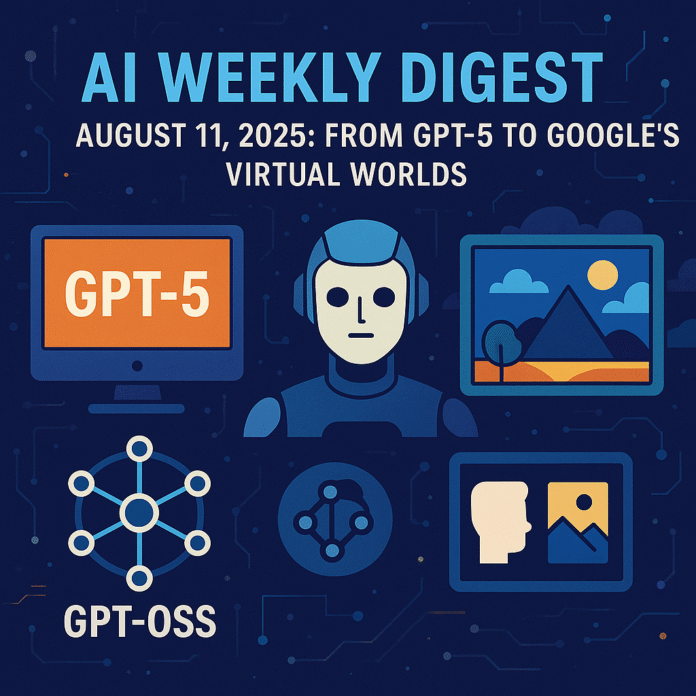Artificial intelligence continues its unstoppable march into everyday life, reshaping industries and personal experiences alike. This week was no exception — with landmark product launches, bold new features, and ambitious visions from the biggest names in tech. Here’s your curated AI Weekly News roundup for August 11, 2025.
Contents
- 1 GPT-5 Officially Launches — ChatGPT Gets a Major Upgrade
- 2 OpenAI Introduces GPT-OSS — The Long-Awaited Open-Weight Model
- 3 Microsoft Wastes No Time — GPT-5 & GPT-OSS Integrated
- 4 xAI Unveils Grok Imagine — AI-Generated Images and Videos
- 5 Google’s Genie 3 — Build Entire Virtual Worlds from a Prompt
- 6 Qwen-Image — Alibaba’s New Visual Generation Powerhouse
- 7 Microsoft’s Project Ire — An AI Cybersecurity Analyst
- 8 Copilot 3D — From 2D Images to 3D Models
- 9 ElevenLabs Enters AI Music Creation
- 10 Final Thoughts
GPT-5 Officially Launches — ChatGPT Gets a Major Upgrade
OpenAI finally unveiled GPT-5, its most advanced large language model yet. Available even to free-tier users, GPT-5 combines unprecedented reasoning capabilities with lightning-fast response times. More than just a chatbot, GPT-5 functions as a full-fledged AI agent capable of coding, scheduling, research summarization, and more.
OpenAI CEO Sam Altman described it as “the first time a model truly feels like you’re speaking with a human expert on any topic.”
OpenAI Introduces GPT-OSS — The Long-Awaited Open-Weight Model
After multiple delays, OpenAI released its first open-weight models in six years — GPT-OSS in two variants:
- gpt-oss-120b: Runs on a single Nvidia GPU, matching performance of the o4-mini.
- gpt-oss-20b: Requires only 16GB RAM, performing on par with o3-mini.
Both can be downloaded from platforms like Hugging Face, Databricks, Azure, and AWS, opening the door for local experimentation and customization.
Microsoft Wastes No Time — GPT-5 & GPT-OSS Integrated
As part of its ongoing partnership with OpenAI, Microsoft integrated GPT-5 directly into Copilot and GPT-OSS into Windows AI Foundry almost immediately after their release. The move underscores Microsoft’s aggressive AI-first strategy.
xAI Unveils Grok Imagine — AI-Generated Images and Videos
Elon Musk’s xAI entered the generative media race with Grok Imagine, capable of producing high-quality images and 15-second narrated videos from text or visual prompts. Competing with Google’s Veo 3 and OpenAI’s Sora, Grok Imagine also features a controversial “spicy” mode that allows limited NSFW imagery — with automated moderation safeguards in place.
Google’s Genie 3 — Build Entire Virtual Worlds from a Prompt
Google DeepMind introduced Genie 3, a breakthrough tool that generates interactive virtual environments from just a few words or a single image. Unlike its predecessor, Genie 3 has extended memory, retaining environments for minutes instead of seconds, and supports “promptable events” — real-time user-triggered changes such as adding objects, weather effects, or characters.
Qwen-Image — Alibaba’s New Visual Generation Powerhouse
From China, Qwen-Image is making waves with its ability to produce visually stunning, text-rich images. Early testers report it may be the most accurate AI for generating images containing complex written elements.
Microsoft’s Project Ire — An AI Cybersecurity Analyst
Microsoft also showcased Project Ire, an AI agent capable of reverse-engineering software to detect malicious files without human intervention. In tests, it identified 90% of harmful Windows drivers with only a 2% false-positive rate.
Copilot 3D — From 2D Images to 3D Models
Microsoft’s new Copilot 3D tool can turn a single 2D image into a 3D model suitable for gaming, animation, VR/AR, and 3D printing — no modeling skills required.
ElevenLabs Enters AI Music Creation
Known for its voice synthesis tools, ElevenLabs launched Eleven Music, enabling users to generate royalty-free music tracks in various genres from text prompts.
AI Short Bytes — Quick Headlines You Shouldn’t Miss
- Elon Musk confirms Grok will now serve sponsored content within responses.
- Geoffrey Hinton warns that AI may soon “think” in languages humans can’t understand.
- Anthropic & Carnegie Mellon: Study finds AIs could launch cyberattacks without explicit instructions.
- AI Chess Match: OpenAI’s o3 defeats Grok 4 in a one-sided game.
- AI in Search & Rescue: Chinese AI locates missing climber in under 48 hours.
- NASA & Google developing AI medical assistants for Mars and Moon missions.
- Nvidia China Report: Allegations of “kill switch” chips sold to China.
- Microsoft recruits former Google DeepMind talent under Mustafa Suleyman’s leadership.
- HAVELSAN to integrate AI into ADVENT naval combat management system for predictive maintenance and decision support.
Final Thoughts
From game-changing model releases like GPT-5 to creative leaps in virtual world generation and AI music, this week reinforces the sense that AI’s evolution is accelerating across every front. As these technologies mature, the challenge will be balancing innovation with ethics, privacy, and human values. Early first impressions of GPT-5 highlight its remarkable speed and accuracy, building on the innovations outlined in GPT-5: A New Era of Artificial Intelligence, while aligning with broader policy directions from the U.S. AI Action Plan 2025.
What’s your take on this week’s AI breakthroughs? Drop your thoughts in the comments below — we’re building the conversation together.
